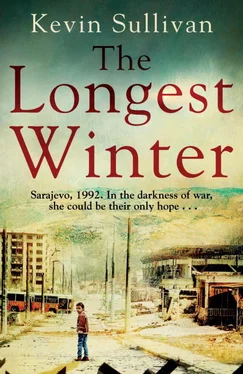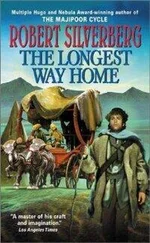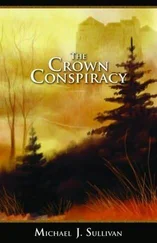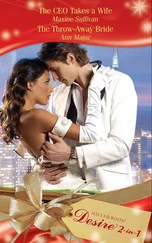‘Maybe the building will collapse,’ Mrs Hatibović said. She peered round the table through her thick glasses.
‘They’re solid structures,’ said Mrs Nurudinović, whose husband had been a builder.
‘They should have put heating in the bomb shelter,’ Mrs Hatibović said.
‘No one ever thought we’d actually have to use the bomb shelter,’ Mrs Nurudinović replied.
‘Well, we should have thought of it. We should have been prepared for the worst.’
‘Who wants to live preparing for the worst!’ Mrs Nurudinović said. ‘We were happy when we prepared for the best!’
‘And look where it got us.’
‘We’ll see these buggers out. That’s for sure!’ Mrs Nurudinović said.
Nina was surprised, because she’d never heard Mrs Nurudinović swear before. She didn’t think Mrs Nurudinović ever swore.
Then Mrs Nurudinović said, ‘Justice is slow, but it will come.’
Mrs Hatibović put her hand gently on Mrs Nurudinović’s shoulder. ‘We’re looking forward to seeing you on the television,’ she told Nina.
When darkness fell, the attackers fired flares over Otes. Great shards of orange light illuminated the fields that separated the settlement from the western suburbs. A haystack in a field a hundred yards from the government command centre was set on fire by incendiary bullets and burned till after midnight, shedding an eerie flicker over nearby houses that had been destroyed by shelling. The winding, potholed road across the fields and the old industrial estate was now the only link between government troops in Otes and the Western Corpus headquarters near the PTT building. A hail of fire came down on vehicles using the road.
As the light from one flare dulled, before another was fired a battered Toyota made a dash for the city. Jusuf drove, a wounded soldier lying across the back seat. The Toyota made it as far as the haystack before snipers opened fire. Jusuf guessed that the attackers were properly organised now. There was no automatic fire; they weren’t shooting at random. A bullet whistled behind the car and then, after a second or two, there was another close to the windscreen. Jusuf slowed the Toyota to take the first sharp turn as a star shell exploded above him. The soldier in the back groaned as the car accelerated abruptly coming out of the corner. The tyres growled in the frozen snow.
They’ve missed their chance, Jusuf thought. He guessed the marksmen were tired. Or maybe they were celebrating victory prematurely, too drunk to hit a slow-moving target at a hundred yards.
After the turn he was more confident that they wouldn’t be picked off. He took the cigarette between the middle and index fingers of his right hand and steered the car with his left. Then he reached behind and offered the cigarette to the soldier, but the man was in too much pain to lift his hand and take it.
‘You’ll be in hospital in twenty minutes,’ Jusuf said. The soldier groaned again. Both his legs were broken. Twenty minutes was a long time. Two bullets hit the snow in front of the Toyota. They buzzed. Jusuf had felt confident moments before but now he was less sure. Maybe they’re not celebrating prematurely and maybe they’re not tired. Maybe they just waited for us to reach this stretch.
A government car that had been used to carry troops in and out of the settlement lay abandoned nearby. Jusuf had seen it in Otes in the afternoon so it had been hit in the last few hours. Another star shell turned the land around them a garish shade of yellow. They drove beyond the cover of some bushes past the main factory complex. Jusuf accelerated but then had to slow down again at another sharp turn. He put the cigarette between his lips and took the steering wheel with both hands. He wasn’t going faster than twenty-five miles an hour.
The Toyota hit a pothole and the soldier yelled. Jusuf knew they were approaching their own line. The last stretch of the road was the most uneven. He tried to avoid the next few potholes, but it wasn’t easy in the darkness. He saw the barrier ahead. It was raised, as it should have been. He rolled the window down and looked into the guard post as he drove past. A soldier was crouched behind sandbags, his rifle trained on the Toyota.
‘We’re nearly there,’ Jusuf told the wounded man in the back.
The Television Centre was taking a pounding. Jusuf stopped the car outside the Corpus headquarters and ran into the building. Troops lounged in the lobby. He picked out a man he recognised and told him to take the wounded soldier in the Toyota to the State Hospital.
He started to move along the main ground-floor corridor. ‘It will need two of you to carry him from the car,’ he said over his shoulder. ‘ Don’t lift him by the ankles.’
At the end of the corridor was an office similar to the command centre in Otes, bigger but with the same elements. There was a large table covered in maps and ashtrays overflowing with cigarette ends. There were weapons on narrow tables along one wall. Around the central table sat a dozen men.
Jusuf entered and closed the door behind him. The Bull sat at the head of the table, at the far end away from the door. He carried on speaking as Jusuf came in and took a seat opposite. The Bull was explaining why more troops wouldn’t be dispatched to reinforce Otes.
‘It can’t be defended,’ he said. He shrugged. ‘Even with an attack elsewhere.’
There might have been a small chance of holding the village if there was a push further along the city perimeter.
‘You guys have to face facts,’ he concluded.
The Bull didn’t know much about military strategy but they listened to him with care. Jusuf believed him when he said that no more troops would be sent; he was well-connected – if he said there would be no more troops then there would be no more troops. If he had decided that Otes was to be abandoned then it would be abandoned.
The men disliked being told what to do by a politician in khaki. But in the end they would toe the line. The Bull was sure about that. He wanted the Otes business finished quickly. He was tired and he had a headache.
‘Can we hold the road for another day?’ he asked Jusuf.
‘I doubt it.’
‘How many civilians are still there?’
‘Fifteen hundred.’
‘We’ll evacuate them as soon as it’s light. You had better come up with a plan.’
The Bull and his aide left. Jusuf stayed and they began to plot the evacuation.
At seven o’clock the meeting broke up. Alija was waiting for Jusuf in the corridor outside. When he saw Alija, Jusuf felt his spirits rise. In his bearing, his assumptions, his fastidious manner, Alija was like a creature from another world. He was efficient. He was educated and, as far as Jusuf knew, he wasn’t corrupt.
Jusuf was exhausted and wanted to sleep, but in twelve hours they were going to move hundreds of people over hard terrain. The night would be devoted to desperate preparations.
Jusuf led the other man into a nearby office. He found a sheet of paper and sat down, pen in hand.
He wrote: We are living in times that God did not intend for us. There will be better days. We shall prevail. We shall be together.
Alija found an envelope in a cupboard on the other side of the room and handed it to Jusuf, who wrote Milena’s name on the front and put the note inside.
‘Take this to the bar,’ he said. ‘I’m going back to Otes.’
* * *
Alija walked out into the frozen night. Otes was lost. He’d known it would end like this. It had been clear to everyone, he thought, except those who were fighting the battle.
Alija had been right about many of the things that had happened since the start of the war. He had foreseen the horror. Yet, despite a capacity for realism that sometimes bordered on the cynical, he had not foreseen the extent to which sudden access to power and importance can corrode judgment and morality. Men who had been modest figures were transformed into capricious princelings by the fighting. So many politicians became drunk with the unfamiliar excitement of a country in freefall. They loved to talk about constitutions and referendums and all that razzamatazz. They loved the attention, the conferences, the special flights, the police cars with sirens blaring making a path for them in city traffic, because now they were men of power.
Читать дальше












